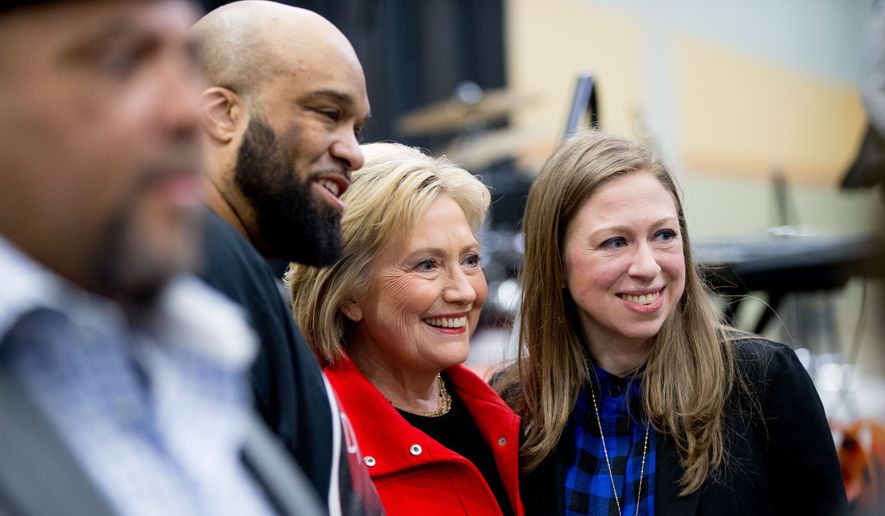Hillary Clinton is looking to rally minority voters in Nevada and South Carolina as a way to blunt the momentum of Sen. Bernard Sanders, whose New Hampshire primary victory this week poked a hole in her campaign narrative.
Mr. Sanders dominated among white, middle-class voters in the Democratic primary, marking a reversal for Mrs. Clinton, who relied on those constituencies in her failed 2008 campaign to counter Barack Obama’s strength among minorities.
This time, it’s Mrs. Clinton who is counting on a more diverse electorate to help her as the race turns westward, where Hispanic voters will play a big role in Nevada’s caucuses, and to the south, where black voters make up more than half of South Carolina’s Democratic primary.
Telegraphing her intentions in her New Hampshire concession speech, Mrs. Clinton called for breaking “the barriers of bigotry,” lamented shootings by police officers and gave a nod to Flint, Michigan, where the water crisis had a devastating effect on the predominantly minority community.
“In conceding NH, @HillaryClinton starts with the travesty of Flint, which will be heard loud and clear in SC,” David Axelrod, Mr. Obama’s former top adviser, said on Twitter.
The Clinton campaign announced Wednesday that prominent black movie stars Angela Bassett, Vivica Fox and Sean Patrick Thomas had plans to stump on her behalf in South Carolina.
Mrs. Clinton also received endorsements from the mothers of Eric Garner, Dontre Hamilton and Jordan Davis. The three black men died as a result of gun violence or at the hands of police.
Mr. Sanders scored a blowout victory in New Hampshire with 60 percent of the vote, compared with Mrs. Clinton’s 38 percent. Clinton advisers were hoping to keep the race within single digits, making the margin of her loss all the more devastating.
Mrs. Clinton lost to Mr. Sanders among all key demographics except voters older than 65, nonwhites and those with household incomes of more than $200,000, according to exit polling.
Perhaps most devastating was the finding that a majority of New Hampshire Democratic primary voters didn’t think Mrs. Clinton was honest and trustworthy, according to The Associated Press.
While Republican voters point to questions surrounding Mrs. Clinton’s emails during her time as secretary of state, Democrats are likely docking her for her unwillingness to release the transcripts of her paid Wall Street speeches.
Mr. Sanders, while pushing his message of economic inequality, has hit Mrs. Clinton for accepting cash from Wall Street and large industry groups while saying it won’t influence her policies.
“What we’re seeing is a generational change in the Democratic Party,” said Andrew Smith, of the University of New Hampshire’s Survey Center. “To young people, socialism doesn’t mean the Cold War or gulags; it means their summer vacation to Europe.”
Mr. Sanders’ campaign said it raised more than $5 million in the 18 hours after the primary victory.
Mr. Sanders also said he is ready to fight in Nevada and South Carolina.
He sought to counter Mrs. Clinton’s support among black voters by holding a high-profile breakfast meeting with the Rev. Al Sharpton in New York City.
The two met at the same restaurant where Mr. Sharpton sat down with candidate Barack Obama in 2008.
Although Mr. Sharpton has not offered a formal endorsement of Mr. Sanders, the meeting is a sign that black leaders are giving the senator from Vermont another look. Former NAACP President Benjamin Jealous has endorsed Mr. Sanders, saying the senator has been a consistent, clear voice against racism.
Mr. Sanders has plenty of ground to make up.
A recent Fox News poll shows that Mrs. Clinton has 71 percent of the nonwhite vote compared with 20 percent for Mr. Sanders.
A December poll by YouGov showed Mrs. Clinton winning about 80 percent of the black vote in South Carolina compared with 20 percent for Mr. Sanders.
Mrs. Clinton spent Monday in New York amid reports that she was considering a campaign shake-up.
Democratic strategists have faith that she can retool her campaign and messaging and emerge as the party’s nominee.
“I expect the Clinton campaign to make a very aggressive case, over the next several weeks, that her experience and tenacity will be used as president to fight on behalf of the values and policies that motivate the progressive base of the Democratic Party — namely, ending economic inequality, protecting voting rights and stopping Donald Trump or whoever ends up as the Republican nominee,” said Craig Varoga, campaign strategist and longtime Democratic Party political operative.
⦁ Ben Wolfgang contributed to this report.
• Kelly Riddell can be reached at kriddell@washingtontimes.com.




Please read our comment policy before commenting.